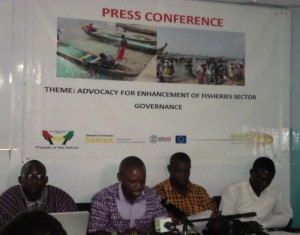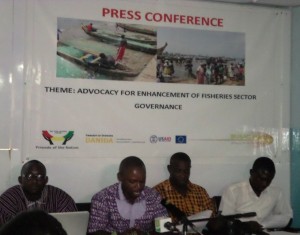Friends of the Nation with the support of BUSAC Fund held a press conference on April 14, 2015, to engage the media on challenges of enforcement of Fisheries laws and the need to enhance governance of the sector. The press engagement discussed issues of weak enforcement and low compliance of the Fisheries laws and aimed at initiating discussions among policy makers, media and relevant stakeholders.
Importance of Fisheries Sector in Ghana
At the conference, the importance of Ghana’s Fishing industry was highlighted. The sector contributes significantly towards the social, cultural and economic development of the country. Not only does it provide direct employment for about 10% of the Ghanaian population, it also contributes about 4,5% of GDP. The fisheries sector therefore has far-reaching implications for food security in Ghana.
In spite of the enormous contribution to Ghana’s economy, the sector is currently faced with the challenge of declining fish stocks due to weak governance. This is manifested as over-capacity, over-fishing and widespread Illegal, Unreported and Unregulated (IUU) fishing. The situation has worsened due to weak monitoring and enforcement of fisheries laws as well as lack of the development and implementation of a compliance strategy by responsible agencies. The consequence: Fishermen nowadays spend more time, more energy, more money, but get less and less fish each day.
The need for an enforcement and compliance strategy
The absence of an enforcement and compliance strategy has allowed rampant illegal and unsustainable fishing practices including the use of chemicals, light, dynamites and small-mesh sized nets. This is contributing to a gradual collapse of the sector. A sustainable approach to address this situation therefore requires the development of a comprehensive Enforcement and compliance Strategy in the sector.
Two main principles should guide the strategy: Voluntary Compliance and Deterrence. Voluntary Compliance includes the effort to secure the active support of resource users and their willingness to comply with the necessary legal and regulatory framework and management plans. Deterrence involves the coercive power of the state to enforce its laws and regulations. It includes the power of arrest, prosecution, adjudication and imposition of sanctions when the laws are violated.
There is also the need to develop short-term and long-term policies to support the implementation of effective compliance and enforcement actions.
The press conference stimulated media interest in the issues discussed and some of them indicated to do follow-up stories.
May 01, 2015


